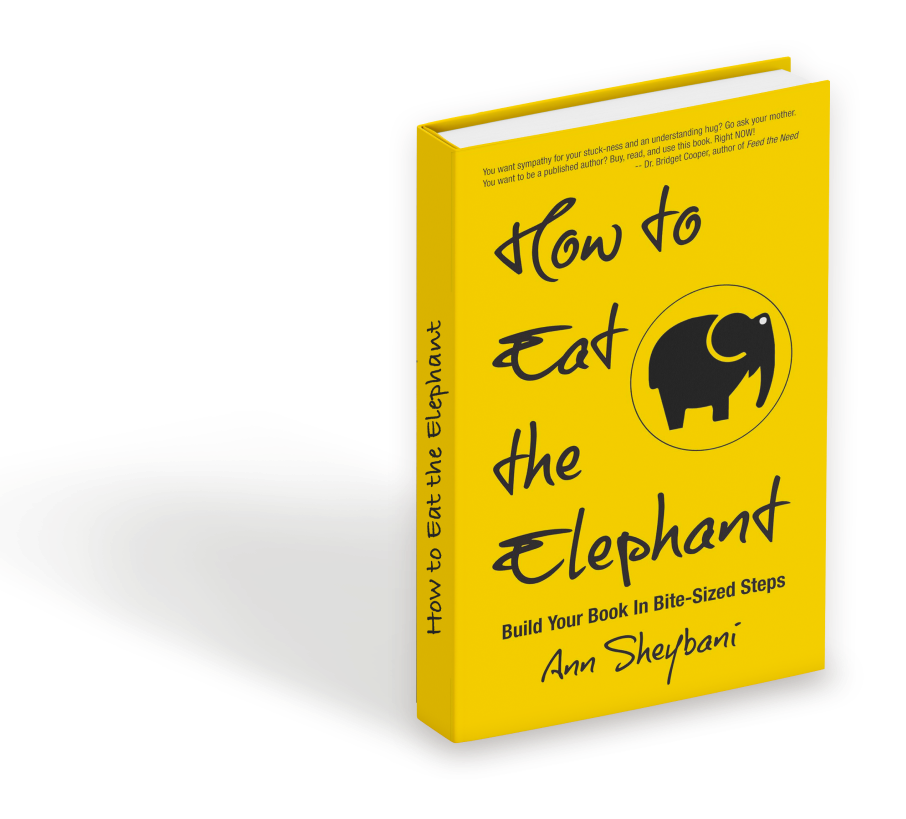Last we met, I was telling you about the client manuscripts I was reading, all of which deal with anxiety.
I thought these three different authors and their three different approaches will demonstrate that you can take a common topic and come at it with a (valuable) unique skew.
This next segment of The Anxiety Series is written by a doctor who specializes in the treatment of anxiety, who views the subject from the perspective of a trained psychologist.
From Dr. Sharyn Kennedy’s upcoming book with the working title, Nine Things You Never Thought Were Anxiety.
Andy calls and wants to book an urgent appointment. He says he’s in an awful place – he hasn’t slept for two days, he’s not eating, and he can’t concentrate. Things are also starting to go haywire at work. Because Andy is a high-performing top executive, it’s a problem when he starts to miss deadlines, can’t focus in meetings and gets behind in his communications. Andy says he’s starting to panic, and he feels out of control and helpless because he really doesn’t know what to do to make things better. What’s even worse, is that he’s been in a place like this before – and last time, the outcome was serious. He almost had a mental breakdown, and was forced to take leave from work – something he absolutely cannot do in his current role.
I know that this is an emergency and find Andy an evening appointment time.
When he comes to my office, tall, athletic, and sun-browned, I’m surprised to see that he doesn’t look as stressed as I had expected. But, as soon as he starts talking, he tears up, looks slowly down at the floor, then struggles to drag his gaze upwards to meet mine. He tells me that he’s been in a horrible turmoil since his last relationship ended. “I just can’t let go,” he says. At this moment, it is hard to imagine that Andy is the hard-charging top executive I know him to be.
Not being able to let go for Andy means that he’s constantly fantasizing about reigniting the relationship or ruminating about how it might have gone differently. He vacillates between being certain that she was the love of his life to knowing that it was an awful relationship for him, and he did the right thing by ending it. Then the pendulum swings again and he tells himself that he did really love her after all. In the next sentence he reassures himself that the relationship was not a good one for him.
“What’s wrong with me that I can’t have a good relationship?” he asks during our conversation. His last relationship collapsed when he discovered his girlfriend (living in another country) had moved onto another relationship. And he worries that what has happened in his past relationships is now impacting his ability to manage any sort of relationship. He says, “I need to change, but I don’t know how.”
Even though the relationship ended three weeks ago, Andy can’t move on and can’t get over the feeling of being rejected. Part of him knows that the relationship wasn’t working well, but this logical knowledge doesn’t seem to fix his hurt feelings.
It takes a while for Andy to actually say what he thinks has been bothering him the most, but eventually I coax it out of him.
Andy winces as he says he’s afraid that he will eventually end up alone.
Whenever this thought comes into his head, even dimly, Andy starts to feel panicky. His panic feels like a dark, black emptiness, which spurs the desperate desire for a relationship. Andy says that when he gets that panicky feeling, he can’t think of anything else but the breakup. He says he also can’t cope with these awful feelings. So, sometimes, he shoves the panic aside, preferring to feel “numb,” as he describes it.
Many times, Andy recognizes that his thoughts flip him straight into unproductive behavior. He recognizes that he’s becoming needy, exhausting the goodwill of his colleagues and friends by talking endlessly about his relationship and breakup. Even though he feels their disinterest, he can’t let the subject go.
All Andy wants is for this thinking, feeling, and talking to go away. He’s sure that if he can’t manage his feelings and falls apart like last time, he will not be able to stay in his current managerial role.
Why can’t Andy let go?
Andy’s emotions about his breakup are strong and acute, and his brain is trying to make sense of the hurt. Because he can’t stop thinking about the relationship, he’s constantly revisiting the memory, keeping his thoughts and feelings just as fresh and raw as when the breakup happened. Each time Andy recalls the memory, he’s strengthening that brain path, making it harder to forget. Brains more easily remember emotional material because we’re wired to pay more attention to emotions and people than we are to things.
The shock and disbelief Andy feels because of the breakup bring up old hurts and vulnerabilities, which in turn reinforce his current emotional state. Because he’s had a number of broken relationships, he has a hard time trusting his partners, and he’s afraid that he’ll never feel safe in a relationship again. Andy’s belief about his relationships overall seems to center on his conviction that in the end he will remain alone.
Andy typically deals with stress by taking control and fixing the problem. But this problem-solving approach means he’s at a loss when he’s facing emotion-based issues. Instead of simply acknowledging that a breakup is painful and allowing himself to get through the pain, Andy’s problem-fixing brain keeps trying to come up with a rational way to handle inherently irrational emotions. This approach virtually guarantees that Andy won’t be able to let go.
Why is Andy not managing his emotions well?
Andy is stuck in a thinking-feeling cycle that’s becoming increasingly negative. To understand why this cycle keeps going, let’s look at a) how Andy generally manages his thoughts and feelings and b) what Andy believes about relationships.
Andy is more cerebral than he is emotional. He’s rational, analytical and loves language, and he’s more likely to answer questions from his thinking brain, describing his feelings by naming his thoughts. He’s no stranger to worry and overthinking. He’s always been a worrier and is familiar with the overanalysis and negative thoughts that crowd his brain when he’s under stress.
I want Andy to know that the unceasing mental chatter and ongoing rumination is feeding into his feelings and making them worse. If Andy can’t acknowledge and connect with his feelings, he will struggle to manage them, and he’ll experience them over and over again.
Andy tells me that he’s not used to talking about his emotions and that feelings were never discussed in his family when he was growing up. His father was a cheerful, caring and sensitive individual who kept any negative emotions well hidden. His mother, although she worried a lot, worked hard to keep things smooth and happy, too. Andy learned that difficult and unpleasant emotions should be kept under wraps – ignored, pushed away, or covered over with a distraction. When Andy experiences emotions that are awful, he now sees them as embarrassing, and assumes that they make him look weak. He instinctively does whatever he can to get rid of them. We know though, that if he tries to ignore them or push them away, they will become stickier and stronger. That’s why Andy’s struggle to let go has been futile.
When he’s not trying to fix his emotions, Andy chooses to avoid them, as for most of his life, they’ve been a source of ongoing pain and discomfort. Andy’s standard approach is to distract himself by running – a sport he loves. But he can only distract himself with exercise so much. Eventually he’ll have to finish his run, slow down and learn to be with his feelings. Right now, when he’s faced with an emotionally fraught situation that he can’t avoid and can’t control, he becomes fearful.
The feelings that Andy has about his latest breakup match his past experiences of relationships that have left him feeling vulnerable and afraid. When he feels this way, Andy’s beliefs about relationships are triggered and he experiences the awful feelings that go with the idea that he’ll be left all alone. If Andy doesn’t change this belief, he’ll feel trapped in the cycle of not letting go.
Why is ‘not letting go’ anxiety?
Because relationships are critically important to us, we humans are extremely sensitive to feelings such as rejection, abandonment, and loneliness. When we experience these feelings in relationships, even slightly, we start to feel unsafe and so become scared and anxious.
There are two things we can work on to help Andy feel less anxious around relationships. …
______________________________________________________________________________
If you’d like to learn more about Sharyn and her work, particularly her treatment of anxiety, click HERE to view her website.


